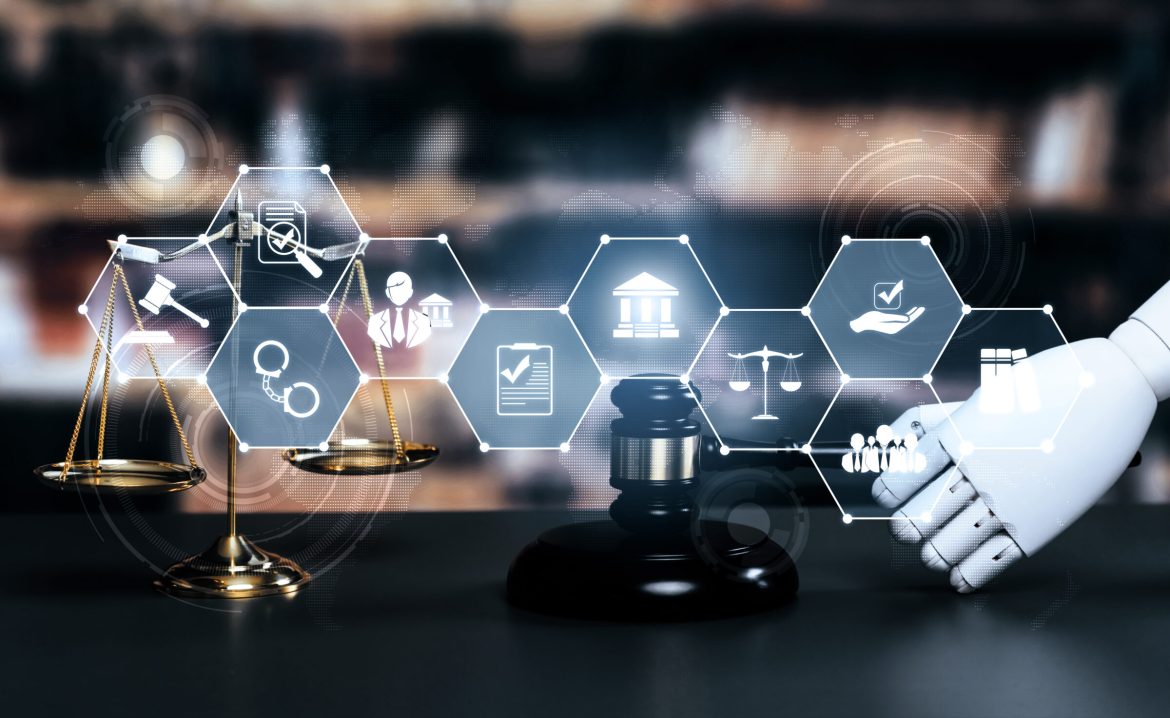How AI is Revolutionizing the Legal Industry in the United States
Artificial Intelligence (AI) is transforming industries across the globe, and the legal sector is no exception. In the United States, AI is revolutionizing the legal industry by enhancing efficiency, improving accuracy, and reshaping the practice of law. This article explores how AI is making an impact in the legal field, highlighting key areas of transformation, benefits, challenges, and future trends.
1. Introduction to AI in the Legal Industry
AI refers to the simulation of human intelligence in machines designed to perform tasks that typically require human cognition. In the legal industry, AI technologies are being integrated into various processes to streamline operations, reduce costs, and enhance legal services. The adoption of AI in law firms and legal departments is reshaping how legal professionals work and deliver services.
2. Key Areas of AI Impact in the Legal Industry
a. Legal Research and Document Review
AI is significantly transforming the way legal research and document review are conducted:
- Efficient Legal Research: AI-powered legal research tools, such as natural language processing (NLP) and machine learning algorithms, can quickly analyze vast amounts of legal texts, case law, and statutes to provide relevant case precedents and legal insights. These tools can reduce the time required for legal research from hours to minutes, allowing attorneys to focus on more strategic tasks.
- Automated Document Review: AI algorithms are used to review and analyze large volumes of documents in litigation and due diligence processes. AI tools can identify key information, flag relevant documents, and even detect anomalies or inconsistencies in contracts. This automation speeds up the review process and reduces the risk of human error.
b. Contract Analysis and Management
AI is revolutionizing contract analysis and management by offering tools that streamline contract lifecycle management:
- Contract Review and Analysis: AI-powered platforms can analyze contract terms, identify potential risks, and suggest revisions. These tools use machine learning to understand and interpret complex contract language, making it easier for legal professionals to manage and negotiate contracts.
- Contract Management Systems: AI-driven contract management systems help organizations track contract deadlines, compliance requirements, and renewal dates. These systems use predictive analytics to alert users about upcoming obligations and potential issues, ensuring better contract management and reduced risk.
c. Predictive Analytics and Legal Outcomes
AI technologies are enhancing the ability to predict legal outcomes and inform legal strategies:
- Case Outcome Prediction: Predictive analytics tools use historical case data and machine learning algorithms to forecast the likely outcomes of legal cases. By analyzing past rulings, judicial behavior, and case details, these tools provide valuable insights that help attorneys develop more effective legal strategies.
- Risk Assessment: AI-powered risk assessment tools evaluate potential risks associated with legal matters, such as litigation or regulatory compliance. These tools analyze historical data and identify patterns that can guide decision-making and risk management.
d. Virtual Legal Assistants and Chatbots
Virtual legal assistants and chatbots are revolutionizing client interactions and administrative tasks:
- Client Interaction: AI-driven chatbots can handle routine client inquiries, schedule appointments, and provide basic legal information. These virtual assistants offer 24/7 support, improving client engagement and freeing up attorneys to focus on more complex legal work.
- Administrative Tasks: AI-powered tools automate administrative tasks such as document drafting, billing, and timekeeping. These tools streamline administrative processes, reduce administrative overhead, and improve operational efficiency.
e. Legal Analytics and Strategic Insights
AI is enhancing legal analytics and providing valuable strategic insights:
- Legal Analytics Platforms: AI-driven legal analytics platforms analyze large datasets to uncover trends, patterns, and insights relevant to legal practice. These platforms help attorneys understand market dynamics, competitive landscapes, and emerging legal issues.
- Strategic Decision-Making: AI-powered analytics tools support strategic decision-making by providing data-driven insights into legal strategy, market opportunities, and client behavior. These insights help law firms and legal departments make informed decisions and develop effective strategies.
3. Benefits of AI in the Legal Industry
The integration of AI into the legal industry offers numerous benefits:
a. Increased Efficiency and Productivity
AI tools automate routine tasks, streamline processes, and enhance productivity:
- Time Savings: By automating tasks such as legal research, document review, and contract management, AI significantly reduces the time required to complete these tasks, allowing legal professionals to focus on higher-value activities.
- Cost Reduction: Automation and efficiency improvements lead to cost savings for law firms and clients. AI tools reduce the need for manual labor and lower operational costs, making legal services more affordable.
b. Enhanced Accuracy and Consistency
AI technologies improve the accuracy and consistency of legal work:
- Error Reduction: AI algorithms analyze data with precision, reducing the risk of human error in tasks such as document review and legal research. This leads to more accurate legal work and fewer mistakes.
- Consistency: AI tools ensure consistent application of legal standards and practices, reducing variability and ensuring uniformity in legal processes and outcomes.
c. Improved Access to Legal Services
AI contributes to making legal services more accessible:
- Affordable Services: AI-driven tools and platforms lower the cost of legal services, making them more accessible to individuals and businesses that may not have been able to afford traditional legal representation.
- 24/7 Availability: Virtual legal assistants and chatbots provide round-the-clock support, offering legal information and assistance outside of regular business hours.
d. Better Legal Insights and Strategy
AI enhances legal analysis and strategy development:
- Data-Driven Insights: AI-powered analytics provide valuable insights into legal trends, case outcomes, and market dynamics, helping attorneys develop informed strategies and make strategic decisions.
- Predictive Analytics: Predictive analytics tools offer forecasts and risk assessments, enabling legal professionals to anticipate potential issues and plan accordingly.
4. Challenges and Considerations
While AI offers significant benefits, it also presents challenges and considerations:
a. Data Privacy and Security
The use of AI in the legal industry involves handling sensitive data:
- Data Protection: Ensuring the privacy and security of client data is critical. Law firms and legal departments must implement robust data protection measures to safeguard sensitive information from breaches and unauthorized access.
- Compliance: AI tools must comply with legal and regulatory requirements related to data privacy, including regulations such as the General Data Protection Regulation (GDPR) and the California Consumer Privacy Act (CCPA).
b. Ethical and Professional Concerns
AI raises ethical and professional concerns within the legal industry:
- Bias and Fairness: AI algorithms can inadvertently perpetuate biases present in historical data. It is essential to address potential biases and ensure that AI tools are fair and impartial in their analysis and recommendations.
- Professional Judgment: While AI can assist with legal tasks, it cannot replace the professional judgment and expertise of attorneys. Legal professionals must use AI as a tool to augment their capabilities, not replace their critical thinking and decision-making.
c. Integration and Adaptation
Integrating AI into existing legal practices can be challenging:
- Technology Adoption: Law firms and legal departments may face resistance to adopting new technologies. It is important to provide training and support to ensure a smooth transition to AI-driven workflows.
- System Integration: AI tools must be integrated with existing systems and processes. Ensuring compatibility and seamless integration is crucial for maximizing the benefits of AI in legal practice.
5. Future Trends in AI and the Legal Industry
As AI continues to evolve, several future trends are likely to shape the legal industry:
a. Advanced AI and Machine Learning
The development of advanced AI and machine learning technologies will further enhance legal capabilities:
- Deep Learning: Advances in deep learning will enable AI systems to better understand complex legal concepts and context, improving the accuracy and relevance of legal analysis.
- Natural Language Understanding: Improved natural language understanding will enhance AI’s ability to interpret and analyze legal language, making legal research and document review even more efficient.
b. Collaboration between AI and Legal Professionals
The future of AI in the legal industry will involve greater collaboration between AI systems and legal professionals:
- Augmented Intelligence: AI will augment human intelligence, providing legal professionals with powerful tools to enhance their work. Collaboration between AI and legal experts will lead to more effective and efficient legal services.
- Human-AI Partnership: The partnership between human judgment and AI capabilities will become increasingly important, with legal professionals leveraging AI tools to support their expertise and decision-making.
c. Expanding Applications of AI
AI’s applications in the legal industry will continue to expand:
- New Use Cases: Emerging use cases for AI in legal practice will include areas such as legal compliance, regulatory monitoring, and alternative dispute resolution. AI will play a growing role in addressing various legal challenges.
- Globalization: AI technologies will facilitate cross-border legal practices and international legal services, enabling law firms to manage global clients and legal matters more effectively.
6. Conclusion
AI is revolutionizing the legal industry in the United States by enhancing efficiency, accuracy, and accessibility. From legal research and document review to contract management and predictive analytics, AI technologies are reshaping how legal professionals work and deliver services. While AI presents numerous benefits, including cost reduction and improved legal insights, it also poses challenges related to data privacy, ethics, and integration.
As AI continues to advance, its impact on the legal industry will grow, offering new opportunities and transforming legal practice. Legal professionals must embrace AI as a powerful tool to augment their capabilities and stay ahead in a rapidly evolving legal landscape. By understanding and leveraging AI, the legal industry can achieve greater efficiency, innovation, and excellence in delivering legal services.



